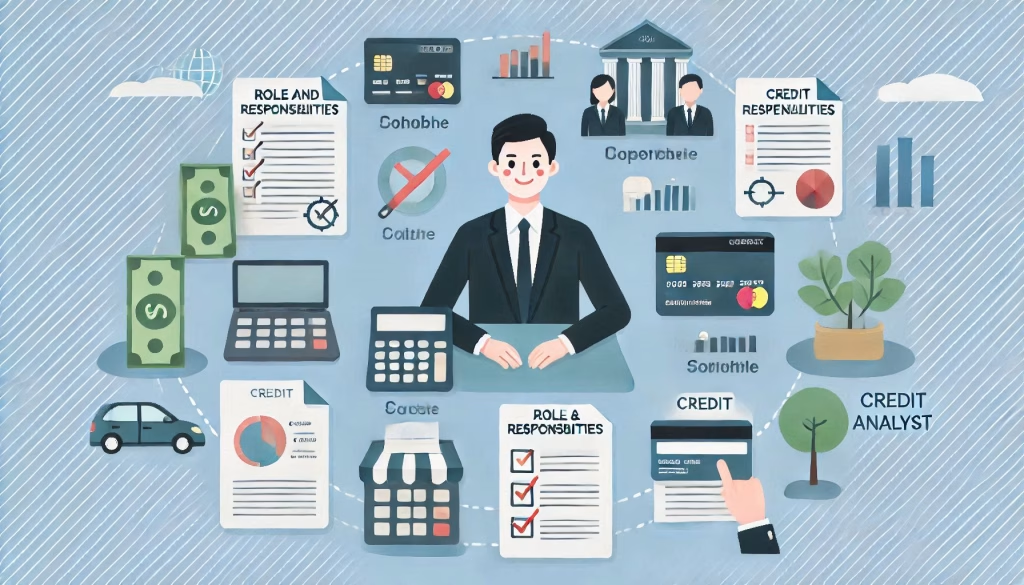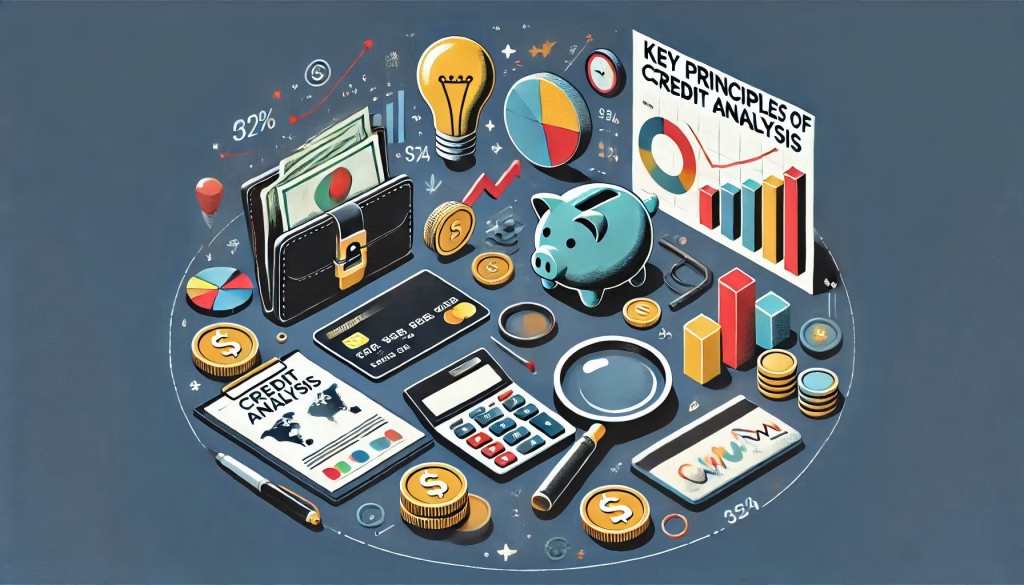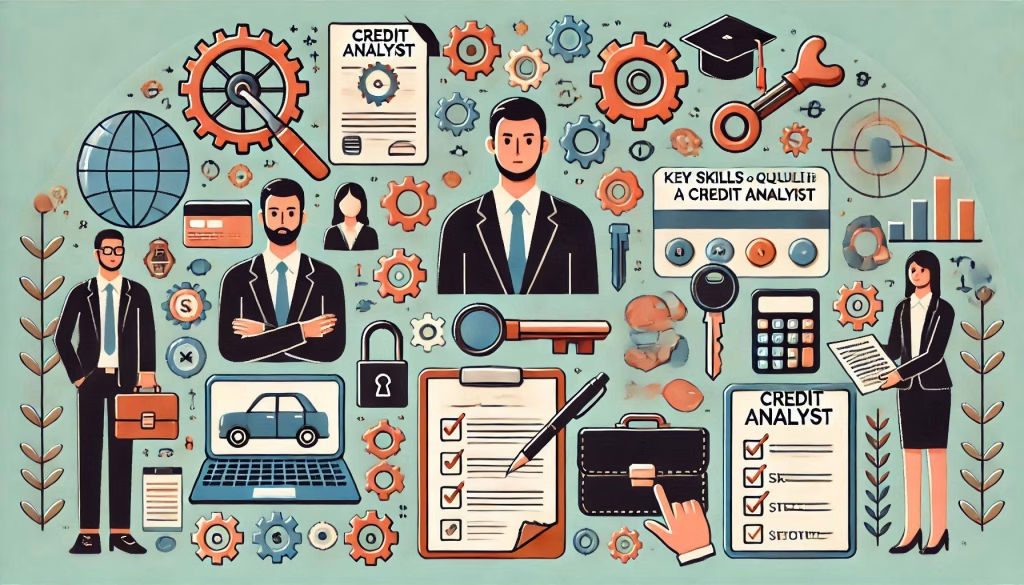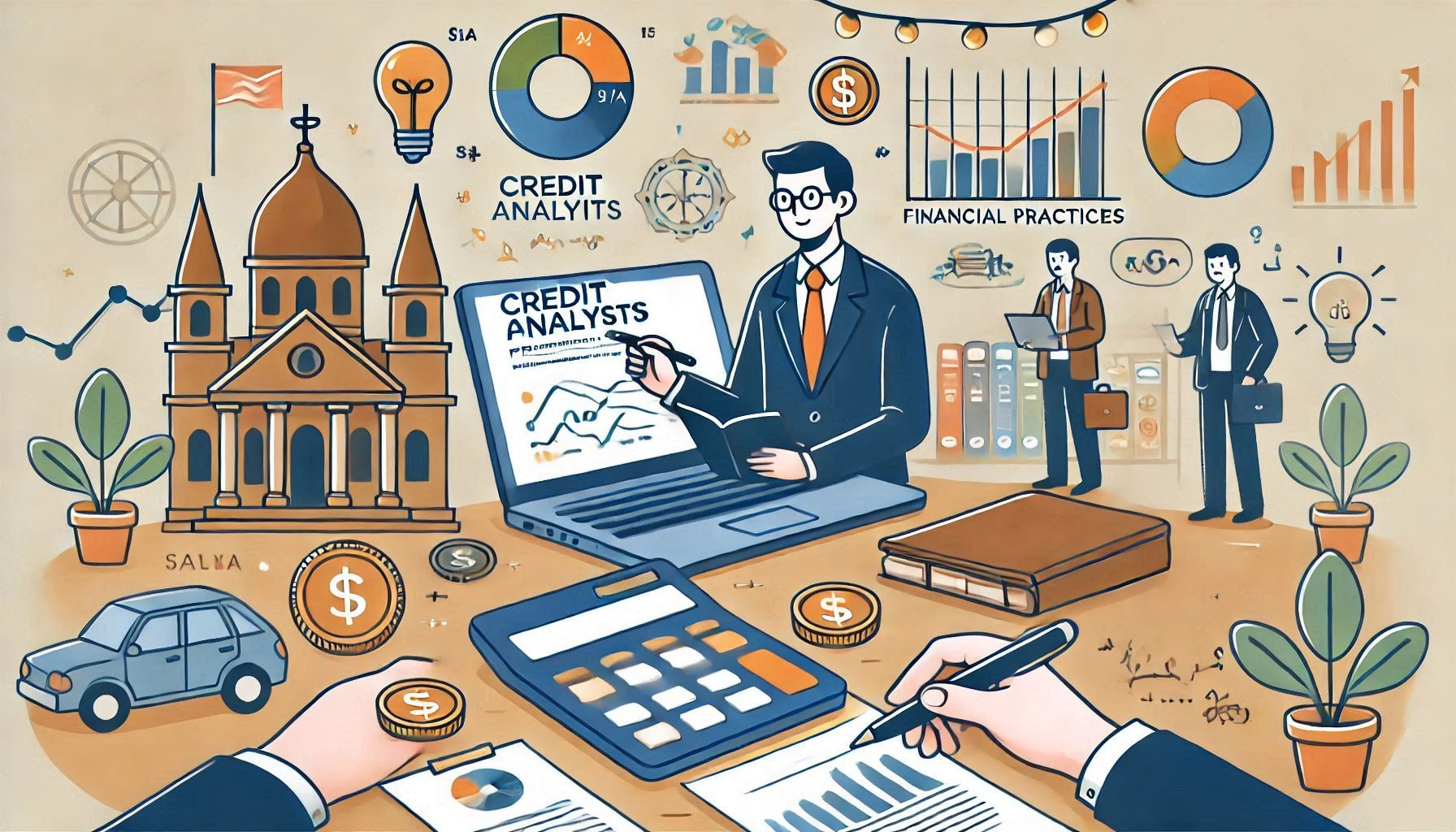Table of Contents
- Overview
- Definition of a Credit Analyst
- Role and Responsibilities of a Credit Analyst
- Key Principles of Credit Analysis
- Key Skills and Qualifications of a Credit Analyst
- Challenges Faced by Credit Analysts
- The Importance of Credit Analysts in the Financial Industry
- Best Practices for Credit Analysts
- Case Studies and Real-World Examples
- The Conclusion
Overview
Credit analysts play a pivotal role in the financial industry, ensuring that lending decisions are based on sound analysis and riskRisk Risk is a loss that occurs to the insured individual or object. Various bad possibilities could happen to someone. management. Their evaluations help financial institutions make informed lending decisions, manage risksRisk Risk is a loss that occurs to the insured individual or object. Various bad possibilities could happen to someone., and ensure financial stability. This article delves into the principles and practices that guide credit analysts in their work, providing insights into their responsibilities, challenges, and the skills required for success.
When applying for a loan a bank, customers are typically assisted by bank who serve as credit analysts. Their objective is to assess the feasibility of the loan based on the customer’s actual financial situation. If the condition is deemed feasible, the customer’s application is automatically approved by bank.
Given the significant importance of a credit analyst’s role in the banking industry, it is unsurprising that this profession is highly sought after, not only by Eve but also by Adam.
If you are interested in working as a credit analyst, it is important to first understand the definition, duties, and principles of. This knowledge will help you make informed decisions and avoid any potential missteps in your career path.
Definition of a Credit Analyst

A credit analyst is a financial professional who assesses the creditworthiness of potential borrowers. They analyze financial data, credit reports, and other relevant information to determine the likelihood that a borrower will repay their debts. Credit analysts work for banks, credit unions, investment firms, and other financial institutions, playing a vital role in the lending process.
A credit analyst is a professional who assesses creditworthiness of customers on a daily basis. Whether a customer loan or not depends on the decision of the credit analyst. If the credit analyst deems it unsuitable, the customer’s application is automatically rejected, and vice versa.
This assessment aims to ensure that subsequent customer installment payments smoothly, thereby minimizing cases of bad credit. With smooth payments, circulation of within the bank improves.
Analyzing bad credit has become a routine task for credit analysts to ensure secure and targeted payments. Secure in sense that credit payments are received within the agreed period and targeted in the sense that the borrowed money is used for the purposes specified in the loan application, thereby preventing misuse other purposes.
Role and Responsibilities of a Credit Analyst

Credit analysts are responsible for evaluating the creditworthiness of potential borrowers. This involves analyzing financial statements, assessing risk factors, and preparing detailed credit reports. They must also monitor existing credit accounts to ensure ongoing compliance with lending terms and identify any potential issues that may arise.
Role and Responsibilities of a Credit Analyst No.1
InsuranceWhat.com
Assessing Creditworthiness
Credit analysts evaluate the financial health of individuals or businesses applying for loans. This involves reviewing financial statements, credit reports, and other relevant data to determine the likelihood of repayment.
Role and Responsibilities of a Credit Analyst No.2
InsuranceWhat.com
Analyzing Financial Statements
A thorough analysis of financial statements, including balance sheets, income statements, and cash flow statements, is crucial. This helps in understanding the financial stability and performance of the borrower.
Role and Responsibilities of a Credit Analyst No.3
InsuranceWhat.com
Risk Assessment and Management
Identifying and assessing potential risks associated with lending is a key responsibility. Credit analysts use various risk assessment models and tools to evaluate the probability of default and the potential impact on the financial institution.
Role and Responsibilities of a Credit Analyst No.4
InsuranceWhat.com
Preparing Credit Reports
Detailed credit reports are prepared to summarize the findings of the credit analysis. These reports are used by decision-makers to approve or deny loan applications.
The primary responsibility of credit analysts is analyze credit applications from debtors. Additionally, they must conduct various checks on the financial condition of prospective debtors both individuals and companies. The objective is to determine the level of credit risk, categorizing it as high, medium, or risk.
Role and Responsibilities of a Credit Analyst No.5
InsuranceWhat.com
Monitoring and Reviewing Existing Credit
Continuous monitoring of existing credit accounts is essential to ensure that borrowers comply with the terms of the loan. This helps in identifying any early signs of financial distress and taking corrective actions.
Role and Responsibilities of a Credit Analyst No.6
InsuranceWhat.com
Communicating with Stakeholders
Credit analysts often communicate their findings and recommendations to various stakeholders, including loan officers, underwritersUnderwriter A person who has expertise in assessing or reviewing the various risks of a policyholder to determine whether a prospective customer is entitled to receive insurance or not., and senior management. Effective communication is essential to ensure that all parties are informed and aligned.
Key Principles of Credit Analysis

Credit analysis is a fundamental aspect of the financial industry, playing a crucial role in the decision-making process for lending and investment. It involves evaluating the creditworthiness of individuals, businesses, and other entities to determine their ability to repay loans and meet financial obligations. This article explores the key principles of credit analysis, providing a comprehensive understanding of the methodologies and practices that guide credit analysts in their work.
Key Principles of Credit Analysis No.1
InsuranceWhat.com
The Five Cs of Credit
One of the most widely recognized frameworks in credit analysis is the Five Cs of Credit. These principles help analysts assess the risk associated with lending and make informed decisions.
Character
This principle evaluates the borrower’s reputation and track record for repaying debts. It involves assessing the borrower’s credit history, references, and overall trustworthiness. A borrower with a strong character is more likely to honor their financial commitments.
Capacity
Capacity refers to the borrower’s ability to repay the loan based on their income and existing debt. Analysts examine the borrower’s cash flow, income stability, and debt-to-income ratio to determine their capacity to meet financial obligations.
Capital
Capital assesses the borrower’s financial reserves and net worth. It involves evaluating the borrower’s assets, savings, and investments. A borrower with substantial capital is better positioned to withstand financial setbacks and repay the loan.
Collateral
Collateral is the asset that the borrower pledges as security for the loan. It provides a safety net for the lender in case the borrower defaults. Analysts evaluate the value and quality of the collateral to determine its adequacy in covering the loan amount.
Conditions
Conditions refer to the terms of the loan and the overall economic environment. Analysts consider factors such as interest rates, loan duration, and economic conditions that could impact the borrower’s ability to repay the loan.
Key Principles of Credit Analysis No.2
InsuranceWhat.com
Importance of Due Diligence
Due diligence is a critical component of credit analysis. It involves thoroughly investigating and verifying the information provided by the borrower to ensure its accuracy and reliability. Due diligence helps analysts uncover potential risks and red flags that may not be immediately apparent.
Key Principles of Credit Analysis No.3
InsuranceWhat.com
Understanding Industry and Market Trends
Credit analysts must stay informed about industry and market trends that could impact the borrower’s financial health. This involves analyzing economic indicators, regulatory changes, and competitive dynamics.
Key Principles of Credit Analysis No.4
InsuranceWhat.com
Regulatory Compliance and Ethical Standards
Adhering to regulatory requirements and maintaining high ethical standards is crucial in credit analysis. This ensures transparency, fairness, and integrity in the lending process.
Key Skills and Qualifications of a Credit Analyst

To excel in their roles, credit analysts must possess a combination of technical and soft skills. Some of the key skills and qualifications include:
Key Skills and Qualifications No.1
InsuranceWhat.com
Analytical Skills
Strong analytical skills are essential for evaluating financial data and identifying potential risks. Credit analysts must be able to interpret complex financial information and draw meaningful conclusions.
Key Skills and Qualifications No.2
InsuranceWhat.com
Attention to Detail
Accuracy is critical in credit analysis. Credit analysts must pay close attention to detail to ensure that their assessments are based on accurate and reliable information.
Key Skills and Qualifications No.3
InsuranceWhat.com
Financial Knowledge
A solid understanding of financial principles, accounting, and economics is crucial. Credit analysts must be familiar with financial statements, ratios, and other key metrics used in credit evaluation.
Key Skills and Qualifications No.4
InsuranceWhat.com
Communication Skills
Effective communication is essential for presenting findings and recommendations to stakeholders. Credit analysts must be able to convey complex information clearly and concisely.
Key Skills and Qualifications No.5
InsuranceWhat.com
Problem-Solving Skills
Credit analysts often encounter challenging situations that require creative problem-solving. They must be able to think critically and develop effective solutions to mitigate risks.
Key Skills and Qualifications No.6
InsuranceWhat.com
Technical Proficiency
Proficiency in financial software, data analysis tools, and other relevant technologies is important. Credit analysts must be comfortable using these tools to enhance their efficiency and accuracy.
Key Skills and Qualifications No.7
InsuranceWhat.com
Educational Background
A bachelor’s degree in finance, accounting, economics, or a related field is typically required. Some credit analysts may also pursue advanced degrees or professional certifications, such as the Chartered Financial Analyst (CFA) designation.
Challenges Faced by Credit Analysts

Credit analysts often encounter challenges such as incomplete information, balancing risk and reward, and adapting to economic changes. Managing workload and stress is also a significant aspect of their job, requiring effective time management and resilience.
Credit analysts encounter several challenges in their roles, which require effective strategies to overcome. Some of the common challenges include:
Challenges Faced by Credit Analysts No.1
InsuranceWhat.com
Balancing Risk and Reward
Striking the right balance between risk and reward is crucial in lending decisions. Credit analysts must assess the potential risks and rewards associated with each loan application to make informed decisions.
Challenges Faced by Credit Analysts No.2
InsuranceWhat.com
Adapting to Changing Economic Conditions
Economic conditions can change rapidly, impacting the creditworthiness of borrowers. Credit analysts must stay informed about economic trends and adjust their evaluations accordingly.
Challenges Faced by Credit Analysts No.3
InsuranceWhat.com
Managing Workload and Stress
The role of a credit analyst can be demanding, with tight deadlines and high stakes. Effective time management and stress management techniques are essential to maintain productivity and well-being.
Challenges Faced by Credit Analysts No.4
InsuranceWhat.com
Regulatory Compliance
Adhering to regulatory requirements and maintaining high ethical standards is crucial. Credit analysts must stay updated with regulatory changes and ensure that their evaluations comply with all relevant laws and guidelines.
The Importance of Credit Analysts in the Financial Industry

Credit analysts play a vital role in the financial industry, contributing to the stability and growth of financial institutions. Their assessments help mitigate risks, ensure prudent lending practices, and support the overall health of the financial system. Some of the key contributions of credit analysts include:
The Importance of Credit Analysts No.1
InsuranceWhat.com
Risk Management
By evaluating the creditworthiness of borrowers, credit analysts help financial institutions manage and mitigate credit risk. This reduces the likelihood of defaults and financial losses.
The Importance of Credit Analysts No.2
InsuranceWhat.com
Informed Lending Decisions
Credit analysts provide valuable insights that support informed lending decisions. Their assessments help financial institutions determine the appropriate terms and conditions for loans, ensuring that lending practices are both prudent and profitable.
The Importance of Credit Analysts No.3
InsuranceWhat.com
Financial Stability
By ensuring that loans are granted to creditworthy borrowers, credit analysts contribute to the overall stability of the financial system. This helps prevent financial crises and supports sustainable economic growth.
The Importance of Credit Analysts No.4
InsuranceWhat.com
Supporting Business Growth
Credit analysts play a key role in supporting business growth by providing access to credit for businesses. Their evaluations help businesses secure the financing they need to expand, invest, and create jobs.
The Importance of Credit Analysts No.5
InsuranceWhat.com
Enhancing Investor Confidence
Accurate and reliable credit analysis enhances investor confidence in financial institutions. This supports the flow of capital into the financial system, promoting investment and economic development.
Best Practices for Credit Analysts

To excel in their roles, credit analysts must develop strong communication skills, stay updated with industry developments, and leverage technology for data analysis. Collaboration with other departments and maintaining objectivity are also essential for making unbiased credit decisions.
To excel in their roles, credit analysts must adopt best practices that enhance their effectiveness and efficiency.
Best Practices No.1
InsuranceWhat.com
Continuous Learning and Professional Development
Staying updated with the latest developments in credit analysis, financial markets, and regulatory changes is essential. This can be achieved through professional certifications, training programs, and industry conferences.
Best Practices No.2
InsuranceWhat.com
Utilizing Technology and Analytical Tools
Leveraging advanced technology and analytical tools can enhance the accuracy and efficiency of credit analysis. This includes financial modeling software, data analytics platforms, and risk assessment tools.
Best Practices No.3
InsuranceWhat.com
Collaboration with Other Departments
Working closely with other departments, such as risk management, finance, and legal, can provide a holistic view of the borrower’s financial health and potential risks.
Best Practices No.4
InsuranceWhat.com
Maintaining Objectivity and Integrity
Credit analysts must remain objective and unbiased in their evaluations. This ensures that lending decisions are based on accurate and reliable information.
Case Studies and Real-World Examples

Examining real-world examples of successful credit analysis can provide valuable insights into best practices and common pitfalls. Case studies highlight the importance of thorough analysis and the impact of credit decisions on business growth and financial stability.
Case Studies and Real-World Examples No.1
InsuranceWhat.com
Successful Credit Analysis Leading to Business Growth
Case studies of businesses that have achieved significant growth due to sound credit analysis can highlight the importance of thorough evaluations and risk management.
Case Studies and Real-World Examples No.2
InsuranceWhat.com
Lessons Learned from Credit Failures
Analyzing cases of credit failures can provide valuable lessons on the potential pitfalls and challenges in credit analysis. This can help credit analysts develop strategies to avoid similar issues in the future.
The Conclusion
Credit Analyst Is Not A Casual Job
Looking at the duties and principles of a credit analyst, it can be concluded that this profession is not relaxed. This profession has a considerable contribution in banking. Are you sure you’re ready? If the task is challenging for you, then it is not wrong for you to try to become a credit analyst.
credit analysts are vital to the financial industry, ensuring that lending decisions are based on sound analysis and risk management. By adhering to key principles and best practices, they can navigate the challenges of their role and contribute to the success of their organizations. The future of credit analysis will likely see increased reliance on technology and data analytics, further enhancing the accuracy and efficiency of credit evaluations.
Do you think you have other ideas about Credit Analysts: Principles and Practices for Financial Success? You can comment and share your thoughts below, or discuss more in the InsuranceWhat Forum. Also, read more articles about GLOBAL INSURANCE or other interesting insurance topic articles only at InsuranceWhat.com.





